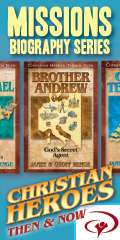I frequently check Pete Wilson’s blog at WithoutWax.tv. Especially lately. Today I found a gold mine there. He published a quote that puts everything into perspective. Perfectly.
G. Cambell Morgan said:
“You are to remember with the passion burning within you, that you are not the child of today, you are not of the earth, you are more than dust; you are the child of tomorrow, you are of the eternities, you are the offspring of Deity.
The measurements of your lives cannot be circumscribed by the point where blue sky kisses green earth. All the fact of your life cannot be encompassed in the one small sphere upon which you live. You belong to the infinite. If you make your fortune on the earth,– poor, sorry, silly soul,– you have made a fortune and stored it, in a place where you cannot hold it.
Make your fortune, but store it where it will greet you in the dawning of the new morning…. We cannot lay up our treasure on earth, it is not characteristic of those in His Kingdom. It was characteristic of the Pharisees. In a sense He was saying to them, “This is just another indication that you are not in My Kingdom no matter what you claim. People in My Kingdom don’t lay up treasure on earth.”
We should be living in a different Kingdom than the people all around us who haven’t made Jesus the Lord of their lives. Some people have called it “the Upside-Down Kingdom”. We humble ourselves, He exalts us. We give to others, He provides for us. We die to ourselves, He gives us life abundantly now and eternal life from now on. We obey Him, He gives us authority. But if we don’t live these principles, we don’t get the promised rewards.
It’s a different kind of life. We should seem kind of strange to the majority. We should appear foolish to those who are storing up their treasures on Earth.
Our family learned how to do this by losing every earthly treasure we had. We willingly gave it up for the spiritual blessings that we knew God wanted to give us. We knew that we had to pay that price. You may not have to, but that’s how God worked it in our lives.
The point is God wants our hearts to be willing to give up everything that pertains to the kingdom of this Earth, just like He said to the rich, young ruler. He may not demand it of you, but He wants you to have your heart in heaven. For where your treasure is, there will your heart be also.
Being willing counts for a lot with Him. Consider Abraham’s willingness to sacrifice Isaac. It counted for righteousness. His obedience showed his faith. His treasure was obviously in heaven. He was willing to do whatever God asked of him, because his treasure was in heaven. Radical, child-like, extreme, foolish faith is what God is after. Is that how you would describe your faith in God?
When (Jesus) comes back will He find faith on the earth?
Luke 18:8
If your treasure is truly in heaven, you will have this kind of faith.
Two of the comments on Pete Wilson’s blog struck me. One person said this quote reminded him of a Charlie Peacock song that had a line, “What if we lived like heaven was a real place?”
The other thought-provoking and clarifying idea among the comments went something like this:
God wants and needs to be in that place in our heart that is filled with “things”- worldly treasure- and the more of that stuff there is in there, the less room there is for HIM.
It makes you wonder about the validity of the American Dream.








 "Oh that God would give every mother a vision of the glory and splendor of the work that is given to her when a babe is placed in her bosom to be nursed and trained! Could she have but one glimpse in to the future of that life as it reaches on into eternity; could she look into its soul to see its possibilities; could she be made to understand her own personal responsibility for the training of this child, for the development of its life, and for its destiny,--she would see that in all God's world there is no other work so noble and so worthy of her best powers, and she would commit to no other's hands the sacred and holy trust given to her." -JR Miller
"Oh that God would give every mother a vision of the glory and splendor of the work that is given to her when a babe is placed in her bosom to be nursed and trained! Could she have but one glimpse in to the future of that life as it reaches on into eternity; could she look into its soul to see its possibilities; could she be made to understand her own personal responsibility for the training of this child, for the development of its life, and for its destiny,--she would see that in all God's world there is no other work so noble and so worthy of her best powers, and she would commit to no other's hands the sacred and holy trust given to her." -JR Miller






